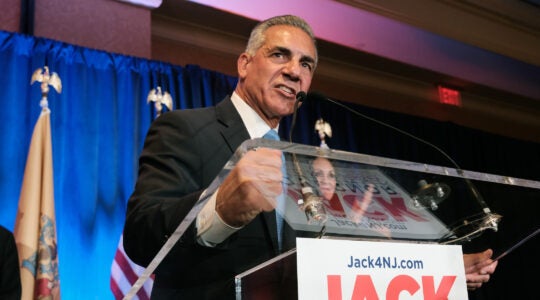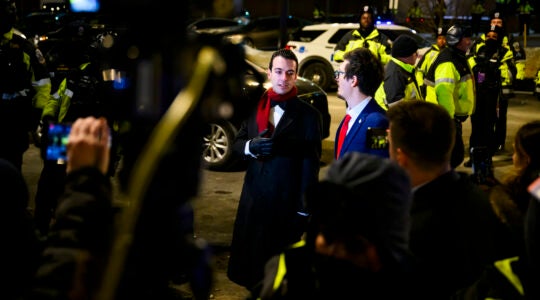(JTA) — The last of three investigations into sexual misconduct in the Reform movement concluded Thursday with the release of a report focused on failures in programs serving youth. Four leaders or former leaders in the movement were named, including its longtime youth director.
Investigators hired by the Union for Reform Judaism, which represents 831 congregations belonging to the largest denomination of American Jews, learned of dozens of incidents of sexual misconduct, including 17 involving inappropriate behavior of adults toward minors, that took place over the past 50 years.
Over this period more than 500,000 minors participated in Reform programs such as overnight summer camps, conferences, Israel trips, and NFTY, the Reform youth movement.
Allegations shared with investigators ranged from verbal sexual harassment and unwelcome sexual advances to sexual touching and sexual assault.
Debevoise & Plimpton LLP, the law firm hired by the URJ to carry out the investigation, found that past misconduct was enabled by various cultural factors, including “an old boys club” atmosphere among the prior generations of camp directors; fear that officials would retaliate against those who complained; and a “hook-up” culture within the NFTY youth movement and at some camps.
The report also found that the movement had knowingly hired clergy who had been fired from congregations for sexual misconduct, but not out of a desire to shield rabbis from accountability. “Rather, these employment decisions resulted from sincerely held beliefs in redemption and the process of teshuvah,” the report says, referring to a Jewish concept akin to restorative justice.
Regardless of the intent of leaders, a lack of transparency about the handling of allegations has helped foster mistrust in Reform institutions, the report adds.
The report credits the movement for having improved, updating its policies and practices over time and displaying a strong commitment to accountability by current leaders.
“That this investigation happened at all reflects a positive and profound cultural change,” the report says, noting that the URJ cooperated with investigators and has committed to implement its recommendations in full.
“We are heartbroken and distressed by these accounts and we profoundly apologize for the enduring pain caused to so many,” URJ President Rabbi Rick Jacobs and Jennifer Brodkey Kaufman, chair of the URJ Board of Trustees, said in a statement.
Calling the abuses described in the report “antithetical to Reform Jewish values,” they added, “Going forward, we are committed to creating environments that better protect the safety and well-being of everyone in our community.”
The report marks the conclusion of a trio of third-party investigations that the Reform movement’s seminary, rabbinical association and synagogue network each initiated last year. The investigators, from three different firms, were charged with scrutinizing allegations of cases of harassment and abuse with a focus on policies and practices that have failed to ensure accountability. Advocates for change within the movement called the investigations “historic.”
The first investigation, about Hebrew Union College-Jewish Institute of Religion, identified patterns of abuse in the seminary’s history when it was released in November. It found that the rabbinical school’s presidents from 1971 to 2000 both harassed and assaulted women at the school; one of them, Rabbi Alfred Gottschalk, was publicly named in an abuse allegation for the first time.
The second, examining the Central Conference of American Rabbis or CCAR, landed in late December. It pointed to loopholes that allowed rabbis accused of abuse to continue working in the Reform movement if they left synagogue positions — loopholes that the rabbinical association said have since been closed.
In this third and final report, investigators scrutinized the practices of the camps, youth programs and other non-synagogue experiences operated by the Reform movement. They spoke with 168 people who reported allegations of abuse and attempted to corroborate each one, concluding that instances of abuse, including against children, had taken place across movement activities over the past five decades.
“It’s very hard report to read. To see that we failed children is tragic, and is the antithesis of our Jewish values,” said Rabbi Mary Zamore, executive director of the Women’s Rabbinic Network, which has long advocated for changes to the Reform movement’s handling of abuse allegations. “And at the same time, we find hope in the commitment to do teshuvah and repair and to continue to build the processes and systems for accountability that need to be in place.”
The investigators found that awareness, supervision and training in the movement has improved considerably in recent years, even before the recent reckoning. While they found five rabbis who continued to work in the movement after being accused of abuse prior to 1996, they did not become aware of any after that time.
Four people are named in the report because investigators found that their misconduct was especially egregious, widespread or long-lasting, and corroborated by several sources. The Jewish Telegraphic Agency has reached out to the rabbis who are still living for comment.
Rabbi Jon Adland was accused of misconduct related to a young child when he was a rabbinical student counselor at a Reform camp in 1977. A camp employee to whom his behavior was reported told the investigators that she did not escalate the concern. Adland worked in multiple synagogues over the following decades and, in 2018, was the subject of a complaint over his behavior with a child sometime between 2005 and 2010. Adland told investigators he did not remember engaging in sexual activity with campers but apologized if he had hurt anyone.
The CCAR told investigators that Adland, who retired in 2019, is barred from working with children. He does not appear on a list that the rabbinical association first published last year of rabbis it has expelled, suspended and censured. He participated in a ceremony installing his successor at Temple Israel of Canton, Ohio, in November, according to the synagogue’s website.
Adland declined to comment to JTA about the allegations against him.
Jerry Kaye, who directed OSRUI, a flagship Reform movement camp, for nearly five decades until 2017, was found to have sexually harassed six women, often by making unwanted sexual advances. Kaye denied behaving inappropriately to investigators and said he had heard about only one allegation made against him. But the investigators found that he had been explicitly directed by the human relations chief at movement in 2003 to review the employee handbook section on harassment “as a result of your conduct in the elevator at the recent Biennial,” the movement’s every-other-year convention.
Kaye also did not always terminate camp employees found to have assaulted young women at the camp, the investigators found.
Rabbi Allan Smith, the movement’s longtime youth director, was the subject of multiple credible complaints of sexual misconduct, the report concludes. The complaints included unwanted touching, inappropriate conversation and encouraging young women on staff at Kutz Camp, a movement camp he led, to pursue sexual relationships with older rabbis.
Smith was the director of OSRUI directly before Kaye and for four decades was the director of NFTY, the Reform youth movement. Investigators heard about a “points system” that encouraged sexualized behavior among campers and were told that the system, which reportedly exists across Jewish denominations’ youth movements, became ingrained at Reform movement camps under Smith’s leadership.
When Smith, known by many as “Smitty,” died in 2019, Jacobs called him “the Reform Movement’s greatest champion of kids and the driving force of our youth programs.”
Rabbi Jay Davis was hired by the Reform movement despite being denied ordination by Hebrew Union College over “numerous, credible reports” that he had sexually abused children at a New York City-area synagogue where he worked. He later worked in a Reform synagogue in Florida and continues to cite his Reform movement credentials in his professional biography. Davis, who now goes by the name Bahir Davis and did not respond to investigators’ request for an interview, does not have any affiliation with the Reform movement, but investigators said they chose to name him because he still works as a rabbi in Colorado.
While the individual cases were egregious, the report concludes, they did not necessarily represent major patterns within the Reform movement. Even so, the movement should continue to shore up its practices for reporting, tracking and responding to abuse allegations, the report recommends.
In a statement responding to the new report, leaders of the CCAR, the rabbinical association, said they are in the process of improving their organization’s ethics systems and will seek to coordinate with the movement’s other branches to make further changes.
The report also identifies some aspects of the Reform movement that could complicate efforts to respond ideally to abuse allegations. For one thing, the report says, many within the movement are confused about the three branches and where to go within each with allegations. Many people who contacted the investigators were seeking to report allegations against pulpit rabbis, who were not part of this investigation.
It also recommends that the branches collaborate more closely to prevent abusers from moving within them, such as by creating a process to inform congregations about rabbinic applicants’ prior sexual misconduct.
And it urges the movement to scrutinize the teshuvah process that employees who are found to have engaged in misconduct can follow to bring themselves back into good standing.
“We recommend that the URJ work with the CCAR and HUC to consider whether the Teshuvah process for religious leaders who have engaged in sexual misconduct has been effective in preventing future misconduct and whether it addresses adequately the needs of individuals and congregations that have been harmed by the misconduct,” the report concludes.
Zamore said the Reform movement is not alone in struggling to think about how to balance concern for survivors of abuse and the idea that people can work hard to change.
“Repair, teshuvah, does not mean the restoration of the perpetrator status,” she said. “We have to be completely survivor centric. When we talk about repair, we have to take instruction from the survivors in terms of what they need and want and not have an overwhelming concern for those who’ve perpetrated. The formula has to be flipped.”
JTA has documented Jewish history in real-time for over a century. Keep our journalism strong by joining us in supporting independent, award-winning reporting.





